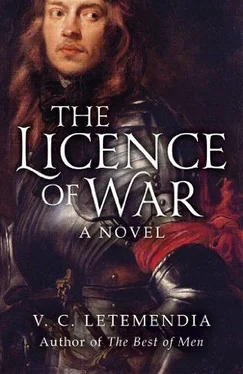Claire Letemendia - The Licence of War
Здесь есть возможность читать онлайн «Claire Letemendia - The Licence of War» весь текст электронной книги совершенно бесплатно (целиком полную версию без сокращений). В некоторых случаях можно слушать аудио, скачать через торрент в формате fb2 и присутствует краткое содержание. Год выпуска: 2014, ISBN: 2014, Издательство: McClelland & Stewart, Жанр: Исторические приключения, на английском языке. Описание произведения, (предисловие) а так же отзывы посетителей доступны на портале библиотеки ЛибКат.
- Название:The Licence of War
- Автор:
- Издательство:McClelland & Stewart
- Жанр:
- Год:2014
- ISBN:978-0-7710-4674-2
- Рейтинг книги:3 / 5. Голосов: 1
-
Избранное:Добавить в избранное
- Отзывы:
-
Ваша оценка:
- 60
- 1
- 2
- 3
- 4
- 5
The Licence of War: краткое содержание, описание и аннотация
Предлагаем к чтению аннотацию, описание, краткое содержание или предисловие (зависит от того, что написал сам автор книги «The Licence of War»). Если вы не нашли необходимую информацию о книге — напишите в комментариях, мы постараемся отыскать её.
The Licence of War — читать онлайн бесплатно полную книгу (весь текст) целиком
Ниже представлен текст книги, разбитый по страницам. Система сохранения места последней прочитанной страницы, позволяет с удобством читать онлайн бесплатно книгу «The Licence of War», без необходимости каждый раз заново искать на чём Вы остановились. Поставьте закладку, и сможете в любой момент перейти на страницу, на которой закончили чтение.
Интервал:
Закладка:
“Until he learnt about the child.”
“Yes,” she said, primly.
“You are full of shit, my girl,” Antonio said. “If he was mad for you, he would have raped you before you fled The Hague. But you might be telling the truth about why he cast you off. Why would he care to be saddled with your spawn, or with you, if you became a nuisance to him.”
Antonio was gratified to see the confidence drain out of her. She hugged the child to her breast. “What more do you want of me?”
“You are to stay here, and behave yourself. I am leaving town for a while.”
“Why must we stay?”
“Because I say so.”
“How long will you be gone?”
“You ask too many questions. And don’t you dare dream of running, or you know what will happen.” He examined her for a moment, tempted. Then he decided to wait, like Monsieur; often a pleasure delayed tasted sweeter.
Back home, Antonio dug out from a coffer in his bedchamber the leather coat he had worn through many of his campaigns; the bloodstains had faded to rust. He slipped it on and surveyed his lean, broad-shouldered figure in the glass. He had a head of thick, distinguished salt-and-pepper hair, most of his teeth, and few aches apart from a throb in his right calf from an old rapier wound. Not bad, for a man of fifty-three.
He was still admiring himself when Teresa walked in. “Don Antonio, why are you dressed in that coat?”
“My dear, I had meant to inform you at supper tonight: I must embark on a voyage, to England.”
“ England? ” she repeated, as though it were an alien planet.
“Today I received a letter from the Earl of Bristol, a dear friend of my late maternal aunt, Elena de Capdavila y Fuentes. He was English ambassador to our Court, when I was in my twenties.”
“Why should he write, after all these years?”
“I was as puzzled myself, yet my aunt had always recommended me to him,” Antonio bluffed, “which brings me to the content of his letter. Our sovereign King Philip has graciously agreed upon a loan to Charles of England, to aid him in crushing a rebellion that has broken out in his kingdom. Bristol wishes to entrust me with the task of delivering the funds. It may involve some danger, but the reward is impossible to refuse.” Antonio named a fabulous sum. “I am to ride for Madrid tomorrow to collect the loan. A royal guard will escort me overland, to set sail from the port of La Coruña.”
Teresa did not speak; and he held his breath. Then she clasped her hands together, tears spilling from her eyes. “Oh, Don Antonio, we are saved! God has finally listened to my prayers.”
“And mine,” said Antonio, exhaling a long sigh of relief.
“And it is such an honour, that you should serve two Royal Majesties.” She dashed away her tears, and with the staggering practicality of women carried on, “You will have to order a suit of warm clothes, and woollen undergarments and hose, the instant you arrive in Madrid. The English climate is reputed to be horrid: nothing but fog and rain and snow. And why not take Diego Sandoval with you? Agustín is too elderly and frail to travel as your valet, but Diego would do well in his place. According to Agustín, he already speaks English. And he would jump at the chance to leave Seville.”
“So he would,” agreed Antonio; Diego was his valet’s nephew, a scholarly youth whose library of forbidden books had attracted the ire of King Philip’s Inquisition. “You are not just beautiful, mi querida — you are a fount of knowledge and wisdom,” he praised his wife, glad that her knowledge did not extend to politics: as if the King of Spain’s coffers were not as empty as his own, and the country not ruined by its war with France. “I’ll talk to Agustín. Diego and I will have a lengthy voyage before us. Plenty of time for him to teach me English.”
IX
Laurence rode through the night, stopping now and again in the small hours of morning to rest his horse. He trotted it into the village of Chelsea around four o’clock the next day; rather better than Violet’s estimation, though he attributed his swift, uneventful journey as much to the stallion’s endurance as to the sway of Prince Rupert’s and Wilmot’s cavalry over the countryside. The commanders were conducting regular patrols in the vicinity, mainly to obtain supplies, but also to harass any Parliament troops unfortunate enough to cross their path.
Laurence stabled his horse with a trusted ostler at an inn near the Chelsea turnpike and went down to the meadows bordering the riverbank; he would have to while away the remaining daylight hours hidden. Rain began to bucket from the skies, so he sheltered in a barn, dozing fitfully on a bale of damp straw, his pistols at the ready.
By evening, the rain had tapered to a drizzle. He drew up the hood of his cloak, slung his saddlebag over his shoulder, and squelched through water-logged pasture towards the quay where the fleets of barges moored. Nearer the quay, he stopped short, dismayed by the sight of Parliamentary militia: a troop of them were apparently inspecting goods destined for the City. By their cloth caps and cheap, thin cloaks, they looked to be London Trained Bands; raw fellows, to judge by their unmilitary bearing. He started off once more at a casual pace, keeping to the shadows, and jumped onto the vessel furthest from them. Crouched behind a row of grain sacks, he waited for them to finish, and for the barge to head out on its journey downriver. After a few minutes, he swore at his ill luck: from the loud tramp of shoes on the wooden deck and snatches of conversation, he realised that his barge, out of all those he might have chosen, was to carry not only goods but the militiamen as well. Raw fellows they might be, but he could not afford the risk. He would have to sneak back onto the quay.
He was contemplating his move when a voice cried, “Who’s there?”
The best defence is attack, Laurence reminded himself. He stuffed his pistols into his saddlebag and emerged, to stare into the barrel of another pistol, held by a nervous militiaman. “What the hell are you doing — put aside your weapon,” he told the man, and gestured at the sacks. “Has duty been paid on this cargo?”
“Duty?” said the man, lowering the pistol.
“Excise duty,” Laurence replied, with curt officiousness. “If it hasn’t been paid to Parliament, I must have it from the owner of the barge. Where can I find him? Come on, come on, answer me.”
“I don’t know, sir, you must talk to Corporal Draycott. He’s in charge.”
“Where’s Draycott, then?” said Laurence, wondering how long he could maintain his performance.
The man went over to a section of the barge where his companions stood bunched, their caps and cloaks dripping. Rain was falling heavily again, and Laurence seized the excuse to bury his face deep into his hood. “Where’s the Corporal?” the man asked them. “Is he on board yet?”
The crew were loosening the ropes that secured the barge to the quay. Laurence calculated the gap in between, as well as his odds of fooling the Corporal, which he decided were slim to negligible. He clutched his saddlebag to his chest, sprinted for the edge, and leapt. Though he cleared the distance, the ground was slippery, and he landed on his knees. “Stop him!” yelled a chorus of voices. A shot whizzed past as he scrambled to his feet. He ran, boots slithering, lost his balance, and fell face down in the mud. When he lifted his head, he saw that he was hemmed in by militia. They dragged him up, crowding round in fascinated silence as he spat and wiped his mouth on his sleeve.
“Give me your saddlebag,” said the man who had accosted him. Laurence obeyed. The man searched inside, and produced Laurence’s pistols. “Excise, eh?” He whistled admiringly at them. “Not with a pair of flintlocks like these.”
Читать дальшеИнтервал:
Закладка:
Похожие книги на «The Licence of War»
Представляем Вашему вниманию похожие книги на «The Licence of War» списком для выбора. Мы отобрали схожую по названию и смыслу литературу в надежде предоставить читателям больше вариантов отыскать новые, интересные, ещё непрочитанные произведения.
Обсуждение, отзывы о книге «The Licence of War» и просто собственные мнения читателей. Оставьте ваши комментарии, напишите, что Вы думаете о произведении, его смысле или главных героях. Укажите что конкретно понравилось, а что нет, и почему Вы так считаете.












